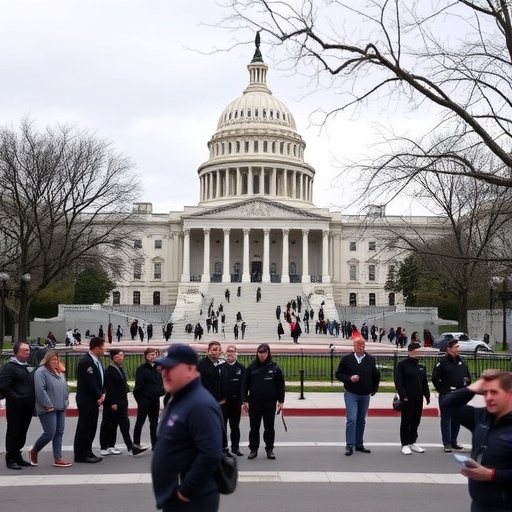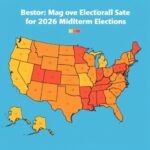U.S. Government shutdown Enters 21st Day: Republican-Democrat Standoff Leaves Federal Employees in Limbo
As the clock ticks past the 21st day of the U.S. Government shutdown, the nation’s capital remains paralyzed by a bitter impasse between Republicans and Democrats in Congress. What began as a dispute over border security funding has ballooned into the longest shutdown in American history, furloughing hundreds of thousands of federal employees and grinding essential services to a halt. With no resolution in sight, the economic and human toll is mounting, raising urgent questions about the future of governance in a divided Washington.
Border Wall Funding Fuels Congressional Gridlock
The root of this prolonged Government shutdown lies in a fierce partisan battle over funding for President Donald Trump’s proposed border wall along the U.S.-Mexico border. Republicans, led by the president, insist on allocating $5.7 billion for the project as a non-negotiable priority for national security. “We need to secure our borders now,” Trump declared in a recent White House address, emphasizing that without the wall, illegal immigration and drug trafficking would continue unchecked.
Democrats, who control the House of Representatives following the midterm elections, have steadfastly refused to budge, viewing the wall as an ineffective and symbolic expense. House Speaker Nancy Pelosi has repeatedly called for a clean funding bill that reopens the government without tying it to what she describes as a “wasteful vanity project.” In a floor speech last week, Pelosi stated, “This shutdown is hurting real people for a political stunt. We must prioritize the American families suffering from this manufactured crisis.”
This standoff in Congress has seen multiple failed negotiation sessions. Senate Majority Leader Mitch McConnell has blocked Democratic proposals for short-term funding extensions, arguing they don’t address the underlying security concerns. Meanwhile, Senate Minority Leader Chuck Schumer has accused Republicans of holding the government hostage to appease the president’s base. According to a recent tally by the Bipartisan Policy Center, this is the third shutdown in a decade, but none have lasted as long as this one, surpassing the 1995-1996 record of 21 days.
The political maneuvering extends beyond Capitol Hill. Trump has threatened to declare a national emergency to redirect military funds toward the wall, a move that could face immediate legal challenges from Democrats and civil liberties groups. Legal experts, including those from the American Civil Liberties Union, warn that such an action would set a dangerous precedent, eroding the checks and balances of the Constitution.
Federal Employees Face Unprecedented Financial Strain
For the more than 800,000 federal employees affected by the government shutdown, the ordeal has turned from inconvenience to crisis. Approximately 380,000 are furloughed without pay, while another 420,000 are working without compensation, including air traffic controllers, TSA agents, and border patrol officers. These federal employees, from entry-level clerks to senior scientists, are now dipping into savings, maxing out credit cards, or relying on food banks to make ends meet.
Take the case of Sarah Jenkins, a 45-year-old IRS auditor from Virginia, who has been furloughed since December 22. “I’ve never missed a paycheck in my 20 years of service,” Jenkins shared in an interview with The Washington Post. “Now, my kids are asking why we can’t buy groceries like usual. It’s humiliating.” Stories like Jenkins’ are proliferating across the country, with federal employee unions reporting a surge in calls to emergency assistance hotlines.
The financial ripple effects are staggering. The Partnership for Public Service estimates that the shutdown is costing the economy $1.3 billion per week in lost productivity and wages. Federal employees, many living paycheck to paycheck, are delaying rent payments, medical bills, and even child support obligations. In a survey by the National Treasury Employees Union, 70% of respondents said they were concerned about covering basic expenses, with 25% already seeking unemployment benefits—a first for many career civil servants.
Compounding the issue, back pay is guaranteed once the shutdown ends, but the uncertainty is eroding morale. A Government Accountability Office report released this week highlights plummeting employee satisfaction, with some agencies seeing resignation rates spike by 15%. For essential workers like those at the FBI and Coast Guard, the unpaid labor adds insult to injury, as they continue vital duties amid personal hardship.
- Key Impacts on Federal Employees:
- Furloughed workers: 380,000+ unable to work or earn pay
- Essential staff: 420,000+ working without immediate compensation
- Economic loss: Over $27 billion since shutdown began
- Mental health toll: Increased anxiety and stress reported in 80% of surveyed employees
Essential Services Grind to a Halt Nationwide
Beyond the personal stories, the government shutdown is disrupting critical public services, from national parks to food safety inspections. Iconic sites like Yosemite and the Grand Canyon have closed their gates, turning away millions of visitors and costing local economies dearly. The National Park Service, operating on minimal staff, reports a loss of $50 million in fees alone during the shutdown’s first three weeks.
Air travel has become a nightmare, with understaffed TSA screeners leading to longer lines and flight delays. The Federal Aviation Administration, despite working without pay, is stretched thin, and safety concerns are rising. In one alarming incident last week, a software glitch at a major airport went unresolved for hours due to unavailable IT support, affecting thousands of passengers.
Food and drug safety are also at risk. The FDA has halted routine inspections of seafood imports and domestic food facilities, potentially allowing contaminated products to reach shelves. The Centers for Disease Control and Prevention has paused disease outbreak responses in several states, leaving vulnerable populations exposed. “This isn’t just politics; it’s public health,” warned Dr. Tom Frieden, former CDC director, in a CNN op-ed. “Every day the shutdown continues, lives are put in jeopardy.”
Small businesses dependent on government contracts are reeling too. Defense contractors and research firms have halted projects, leading to layoffs. The Small Business Administration, crippled by the shutdown, can’t process loans for disaster-hit areas like California, where wildfires have devastated communities. According to the U.S. Chamber of Commerce, over 10,000 small businesses have already furloughed workers due to indirect shutdown effects.
- National Parks Closure: 419 parks affected, with 1.5 million visitors turned away.
- Transportation Disruptions: 45,000 fewer daily screenings at airports.
- Research Halts: NIH clinical trials delayed, impacting cancer and disease research.
- Financial Services: IRS tax refunds delayed for millions, slowing economic recovery.
Public Backlash Grows as Polls Show Waning Support for Shutdown Tactics
As the government shutdown stretches into its fourth week, public opinion is turning sharply against the tactics fueling the stalemate. A new Quinnipiac University poll reveals that 54% of Americans blame President Trump and Republicans for the shutdown, up from 48% two weeks ago. Democrats, while viewed more favorably at 42% blame, are not escaping criticism entirely, with independents expressing frustration over the lack of compromise.
Social media is ablaze with hashtags like #EndTheShutdown and #PayOurFederalWorkers, amplifying voices from affected communities. In Washington, D.C., protests outside the Capitol have drawn thousands, including federal employees chanting for bipartisan action. One demonstrator, a Coast Guard veteran, held a sign reading: “I protected our shores unpaid—now protect my family.”
Economists are sounding alarms about broader implications. Moody’s Analytics projects a 0.1% drag on GDP growth for the first quarter, with consumer confidence at a two-year low. Stock markets have dipped, with the Dow Jones falling 300 points in a single day last week amid shutdown fears. International partners, including the European Union, have expressed concern over U.S. instability, potentially affecting trade negotiations.
Even within parties, cracks are appearing. Moderate Republicans like Sen. Susan Collins of Maine have urged Trump to reconsider his hardline stance, while some progressive Democrats push for more aggressive measures, like withholding congressional pay. Bipartisan groups, such as the Problem Solvers Caucus, are floating compromise bills that include wall funding in exchange for DREAMer protections, but these have yet to gain traction.
Path Forward Remains Murky Amid Escalating Tensions
With no deal in sight, the government shutdown’s endgame is increasingly uncertain. Trump has hinted at further concessions, including temporary reopenings, but only if Democrats agree to wall funding talks. Pelosi, however, remains firm, stating in a press conference that any resolution must come without preconditions that endanger Dreamers or compromise oversight.
Legal battles loom large. Several lawsuits from federal employee unions are progressing through courts, seeking immediate pay or injunctions against the shutdown. The Supreme Court may soon weigh in if Trump’s emergency declaration proceeds. Meanwhile, states are stepping up: California has launched a $100 million fund for affected federal workers, and New York is offering free transit passes to essential employees.
Looking ahead, experts predict the shutdown could extend into February if negotiations falter, potentially overlapping with the State of the Union address. The Congressional Budget Office warns of cascading effects, including delayed tax refunds that could dampen spring spending. Bipartisan leaders are calling for a “cooling off” period, but with midterm gains fresh in mind, both Republicans and Democrats appear dug in.
For federal employees and everyday Americans, the wait continues. As one anonymous Capitol Hill staffer put it, “This isn’t governing; it’s gamesmanship. When will they remember why they’re there?” The pressure is on Congress to find common ground before the human and economic costs become irreversible.








